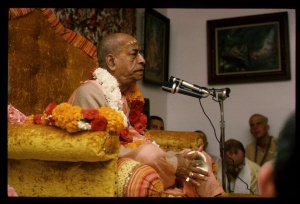SB 2.6.30: Difference between revisions
m (1 revision(s)) |
No edit summary |
||
| Line 1: | Line 1: | ||
{{info | {{info | ||
|speaker=Lord | |speaker=Lord Brahmā | ||
|listener= | |listener=Nārada Muni | ||
}} | }} | ||
[[Category:Srimad-Bhagavatam - Canto 02 Chapter 06]] | |||
[[Category:Bhagavatam Verses Spoken by Lord Brahma - Vanisource|020630]] | |||
<div style="float:left">'''[[Srimad-Bhagavatam]] - [[SB 2|Second Canto]] - [[SB 2.6: Purusa-sukta Confirmed|Chapter 6: Puruṣa-sūkta Confirmed]]'''</div> | |||
<div style="float:right">[[File:Go-previous.png|link=SB 2.6.29]] '''[[SB 2.6.29]] - [[SB 2.6.31]]''' [[File:Go-next.png|link=SB 2.6.31]]</div> | |||
{{RandomImage}} | |||
==== TEXT 30 ==== | ==== TEXT 30 ==== | ||
<div | <div class="verse"> | ||
tataś ca manavaḥ kāle | :tataś ca manavaḥ kāle | ||
ījire ṛṣayo 'pare | :ījire ṛṣayo 'pare | ||
pitaro vibudhā daityā | :pitaro vibudhā daityā | ||
manuṣyāḥ kratubhir vibhum | :manuṣyāḥ kratubhir vibhum | ||
</div> | </div> | ||
| Line 16: | Line 22: | ||
==== SYNONYMS ==== | ==== SYNONYMS ==== | ||
<div | <div class="synonyms"> | ||
''tataḥ''—thereafter; ''ca''—also; ''manavaḥ''—the Manus, the fathers of mankind; ''kāle''—in due course of time; ''ījire''—worshiped; ''ṛṣayaḥ''—great sages; ''apare''—others; ''pitaraḥ''—the forefathers; ''vibudhāḥ''—the learned scholars; ''daityāḥ''—great devotees of the demigods; ''manuṣyāḥ''—mankind; ''kratubhiḥ vibhum''—by performance of sacrifices to please the Supreme Lord. | |||
</div> | </div> | ||
| Line 23: | Line 29: | ||
==== TRANSLATION ==== | ==== TRANSLATION ==== | ||
<div | <div class="translation"> | ||
Thereafter, the Manus, the fathers of mankind, the great sages, the forefathers, the learned scholars, the Daityas and mankind performed sacrifices meant to please the Supreme Lord. | Thereafter, the Manus, the fathers of mankind, the great sages, the forefathers, the learned scholars, the Daityas and mankind performed sacrifices meant to please the Supreme Lord. | ||
</div> | </div> | ||
| Line 30: | Line 36: | ||
==== PURPORT ==== | ==== PURPORT ==== | ||
<div | <div class="purport"> | ||
The daityas are devotees of the demigods because they want to derive the greatest possible material facilities from them. The devotees of the Lord are eka-niṣṭha, or absolutely attached to the devotional service of the Lord. Therefore they have practically no time to seek the benefits of material facilities. Because of their realization of their spiritual identity, they are more concerned with spiritual emancipation than with material comforts. | The ''daityas'' are devotees of the demigods because they want to derive the greatest possible material facilities from them. The devotees of the Lord are ''eka-niṣṭha'', or absolutely attached to the devotional service of the Lord. Therefore they have practically no time to seek the benefits of material facilities. Because of their realization of their spiritual identity, they are more concerned with spiritual emancipation than with material comforts. | ||
</div> | </div> | ||
__NOTOC__ | |||
<div style="float:right; clear:both;">[[File:Go-previous.png|link=SB 2.6.29]] '''[[SB 2.6.29]] - [[SB 2.6.31]]''' [[File:Go-next.png|link=SB 2.6.31]]</div> | |||
__NOTOC__ | |||
__NOEDITSECTION__ | |||
Revision as of 17:54, 16 May 2021

A.C. Bhaktivedanta Swami Prabhupada
TEXT 30
- tataś ca manavaḥ kāle
- ījire ṛṣayo 'pare
- pitaro vibudhā daityā
- manuṣyāḥ kratubhir vibhum
SYNONYMS
tataḥ—thereafter; ca—also; manavaḥ—the Manus, the fathers of mankind; kāle—in due course of time; ījire—worshiped; ṛṣayaḥ—great sages; apare—others; pitaraḥ—the forefathers; vibudhāḥ—the learned scholars; daityāḥ—great devotees of the demigods; manuṣyāḥ—mankind; kratubhiḥ vibhum—by performance of sacrifices to please the Supreme Lord.
TRANSLATION
Thereafter, the Manus, the fathers of mankind, the great sages, the forefathers, the learned scholars, the Daityas and mankind performed sacrifices meant to please the Supreme Lord.
PURPORT
The daityas are devotees of the demigods because they want to derive the greatest possible material facilities from them. The devotees of the Lord are eka-niṣṭha, or absolutely attached to the devotional service of the Lord. Therefore they have practically no time to seek the benefits of material facilities. Because of their realization of their spiritual identity, they are more concerned with spiritual emancipation than with material comforts.